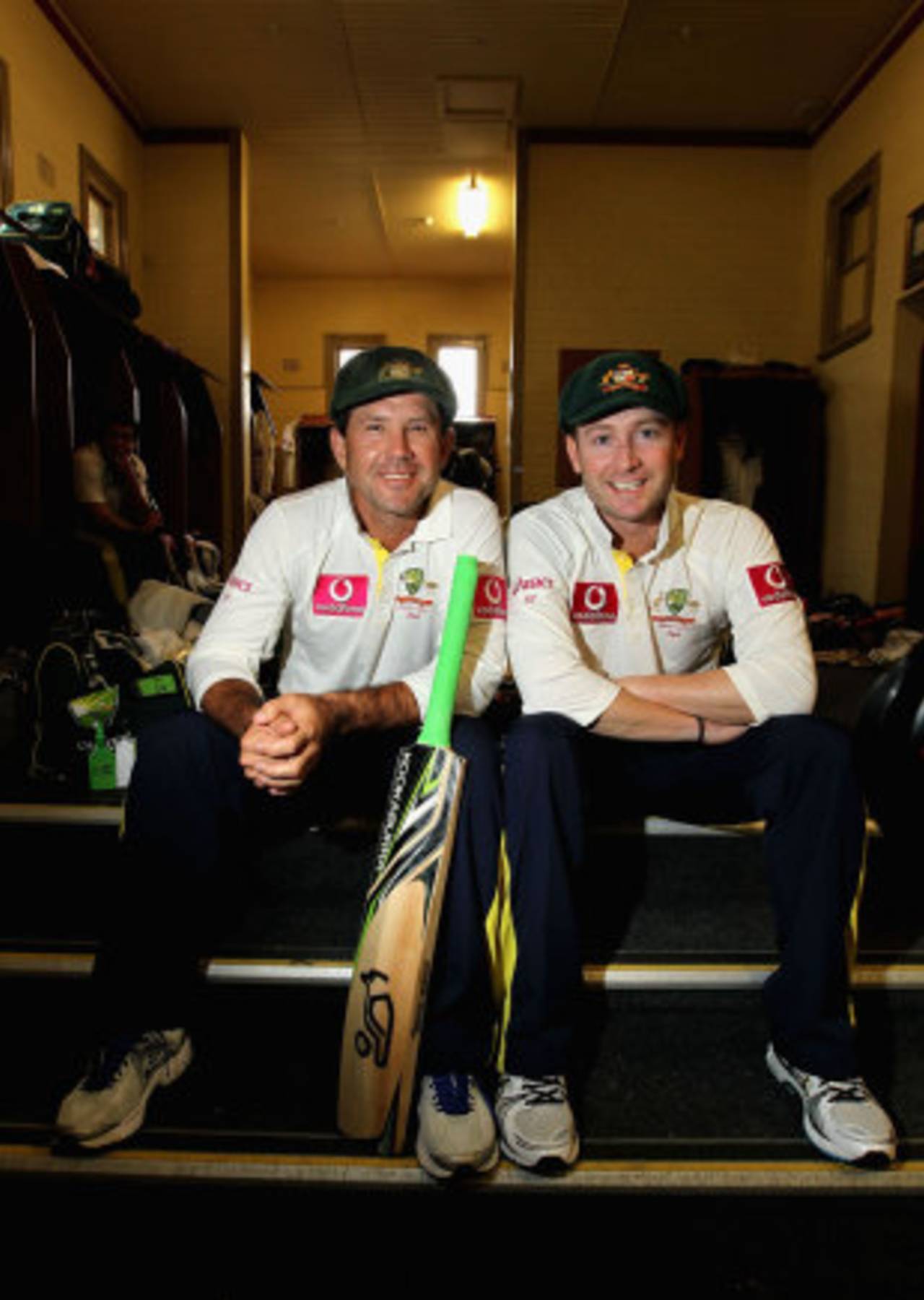It would have been presumptuous to expect too much when
Michael Clarke and
Ricky Ponting resumed their partnership on the second morning at the SCG. Though they have individually been Australia's most commanding and attractive batsmen over the past decade,
seldom have they collaborated in a major partnership. Only once, in fact, could it be said that a Clarke-Ponting union was decisive in the outcome of a Test.
That was the stand of 352
in Hobart against Pakistan, a little less than two years ago. Ponting scored 209 in that game while Clarke's 166 in the match was his highest Test score in Australia before today's double-century. But that partnership came in underwhelming circumstances. Pakistan was a team at war with itself, the Test was a dead rubber, and Ponting was dropped at fine leg before he had scored. Apart from being the jumping off point for Ponting's 33 innings without a hundred, the stand's place in history will be little more than a number.
Not so the alliance that Clarke and Ponting forged on the second day at the Sydney Cricket Ground. Against a faltering but loftily ranked India, in a match critical to the outcome of the series, and on the occasion of the ground's 100th Test match, this was a grand canvas requiring masterful strokes. Memorably and admirably, Clarke and Ponting set about providing them, compiling 288 runs before they were separated. The fall of three quick wickets on the first evening added plenty of urgency to the scenario, as did the fact that in recent times Australia's batting has been about as reliable as English sunshine.
As in most partnerships of great heft, the most vexing work was done early. When they joined each other Clarke and Ponting still had to negotiate a swinging ball, which in the skilful hands of Zaheer Khan had accounted for David Warner, Shaun Marsh and Ed Cowan. Clarke's response to the movement and the situation was to play his shots. There were a few swishes outside off stump that, as India's coach Duncan Fletcher noted dourly, might easily have resulted in an edge and a fourth wicket. But the moment passed, and runs were collected with enough assurance in lengthening first-evening shadows to cause MS Dhoni to spread his field before stumps on the first day.
If the greatest technical obstacles were overcome on the first evening, those confronting Ponting and Clarke on the second were decidedly mental. The pitch had become better for batting, the weather was hot and the ball was losing its shine. Mere occupation would bring runs. But rarely had the pair combined when needed, and so often matches had been lost as a result. Last summer's Ashes series is a glaring example. Against an England side of rare organisation and skill, it was down to Ponting and Clarke to make runs to prevent an otherwise flimsily assembled team from falling to pieces. In arguably the most wretched series of either of their careers, not once did they construct a substantial partnership together, and the urn was lost by a crushing margin.
It was their failure to impose themselves on the Ashes, as much as anything else, that led to an upheaval in Australian cricket. Captain, coach, chairman of selectors and his panel, all were swept away after the Argus review, with the leadership of the team passing from Ponting to Clarke. Amid the greatest wave of introspection to wash over the game in Australia for at least 25 years, Ponting pondered why he and Clarke had not formed the kind of fruitful batting duo their standing, skill and technical contrasts suggested was natural.
"Through our careers, even in the dominant teams, we haven't actually spent a lot of time together out in the middle," Ponting said at the outset of the Tests in Sri Lanka last year. "We had a great partnership in Hobart, and we know how important we are to the team. To tell you the truth we both probably overemphasised that a bit too much last year, and put a little too much pressure on ourselves to be the men that were going to hold the hopes of the team up.
"If you look at the way we play fast bowling and spin bowling it's probably vastly different. Michael tends to use his feet against the spinners a bit more than I do, and we both probably play fast bowling a little bit differently as well. So if you sat back and looked at it that way you'd think we'd be a very successful partnership together, but so far it hasn't been as productive as we would've liked. Hopefully that changes in the next couple of years."
For a time, change appeared unlikely. Ponting loitered closer and closer to the precipice with indifferent days in Sri Lanka and worse ones in South Africa. A vital second-innings half-century
in Johannesburg began his rehabilitation, and he was in good touch by the time Clarke joined him at the SCG. On the second day, their partnership assumed the proportions they had longed for last summer, and went an awful long way towards burying India in this series. Ponting's century, achieved with a hurried single and a dusty dive for the crease, drew the warmest ovation, but the applause for Clarke's maiden double-hundred was not far behind.
When Ponting departed for 134 he looked annoyed at squandering the chance to build even further, something Clarke would go on to do with considerable panache, and relish. But both had tilted the match and the series towards Australia, something they have done so rarely together in the past. As unions go, this was well overdue, and as with Ponting's century, a great deal of the spectators' enjoyment could be derived from the wait that preceded it.
Daniel Brettig is an assistant editor at ESPNcricinfo
